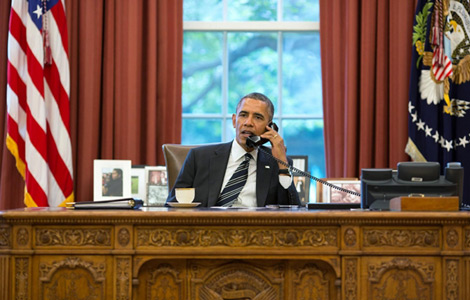Alibaba denies ditching HK for IPO
Updated: 2013-09-27 07:07
By Gao Changxin in Hong Kong and Meng Jing in Beijing (China Daily)
|
||||||||
Alibaba Group Holding Ltd on Thursday denied media reports that it had ditched Hong Kong in favor of the United States for its planned IPO, which is estimated to raise up to $75 billion.
An Alibaba representative in Beijing told China Daily that the country's leading Internet conglomerate is sticking to what it has previously said: that it has made no final decision on the timing, location and terms for the issue, projected to be one of the world's biggest this year.
"Reports claiming that Alibaba has chosen the US over Hong Kong are not true," the person said.
When asked by China Daily whether Alibaba had chosen to list in the US rather than Hong Kong and whether the company had received a final response from the Hong Kong stock exchange, Alibaba Chief Executive Officer Lu Zhaoxi replied "not yet" at about 5 pm on Thursday via his account on Laiwang, a mobile chatting app, that was recently launched by his company.
He didn't say whether his response was to one question or both.
The listing committee of Hong Kong Exchanges & Clearing Ltd held its weekly meeting on Thursday.
Hong Kong media outlets reported that the committee discussed the IPO and decided not to make rule changes to accommodate Alibaba's corporate structure, which allows its minority shareholding management to take control of the board and effectively take control of the company.
A spokeswoman for HKEx declined to reveal the listing committee's discussions, saying that it's a tradition that the agendas at these meetings are not disclosed publicly. She noted that while some media organizations reported the Alibaba IPO was on the agenda, others said it hadn't been discussed.
Charles Li, HKEx's chief executive, on Thursday hinted that the HKEx might not compromise its rules for Alibaba. He wrote in a blog post on Wednesday that "as enshrined in our charter, in the event of a conflict, public interest is put ahead of shareholder interest at HKEx".
Alibaba's talks with the HKEx have focused on its dual-class share structure, where stakes held by management have more voting power than other shares. That structure clashes with the HKEx's charter, which says all shareholders should have equal rights.
Alibaba sought a compromise earlier by saying that it only wanted to secure the right for its partners to nominate the majority of its board members. The HKEx pondered the proposal over the past few weeks.
Exchanges in the US, including the New York Stock Exchange and Nasdaq, permit dual-class shareholding structures. But the prevalence of class action lawsuits over corporate disclosure and negative perceptions of Chinese companies represent a barrier.
Hong Kong, in comparison, has had fewer legal battles and a long record of hosting red chips, or Chinese mainland companies incorporated overseas and listed in Hong Kong. Alibaba is incorporated in the Cayman Islands.
Alibaba is more familiar with Hong Kong. Alibaba.com, the online trading unit of the group, was listed in there previously and privatized last year.
It's something of a tradition for the founders of Internet companies to retain control of their organizations after they go public. Mark Zuckerberg retained control of Facebook Inc after an IPO last year by having his shares carry 10 times the voting rights of ordinary shares.
Google Inc's founders had similar arrangements.
Hong Kong needs a heavyeight such as Alibaba to revitalize its faltering IPO market. The territory was the top global destination for IPOs from 2009 to 2011, but its chances of regaining the crown this year are slim as Chinese growth slows. Many companies have postponed their IPOs in Hong Kong this year as market sentiment weakens.
In July, Nexteer Automotive Group Ltd delayed an IPO in Hong Kong that could raise as much as HK$2.5 billion ($322 million).

 American batman soars through Chinese mountain
American batman soars through Chinese mountain
 Kenya mourns victims of Westgate mall attack
Kenya mourns victims of Westgate mall attack
 Home schooling popular with Chinese parents
Home schooling popular with Chinese parents
 Royal Mint coins to mark Prince George christening
Royal Mint coins to mark Prince George christening
 29th Golden Rooster Awards
29th Golden Rooster Awards
 China marks birthday anniversary of Confucius
China marks birthday anniversary of Confucius
 Obama, Iran's Rouhani hold historic phone call
Obama, Iran's Rouhani hold historic phone call
 Li Na learns from her past
Li Na learns from her past
Most Viewed
Editor's Picks

|

|

|

|

|

|
Today's Top News
Special PLA medical squad starts service
US House votes to delay Obamacare
US spy agency mapped people's behavior -NYT
China won't seek hegemony, FM tells UN
China on yellow alert as Typhoon Wutip nears
Xi to visit attend APEC summit
East China cities debut 4G phones
Shanghai FTZ begins operation
US Weekly

|

|







